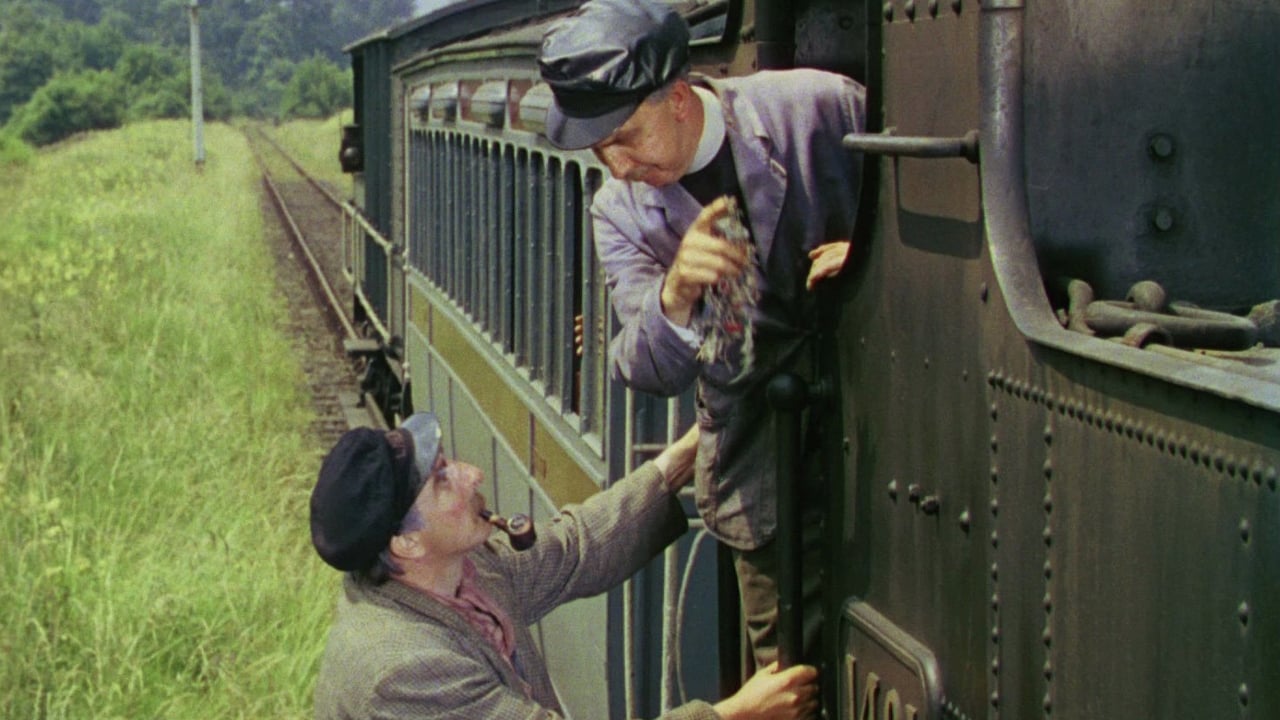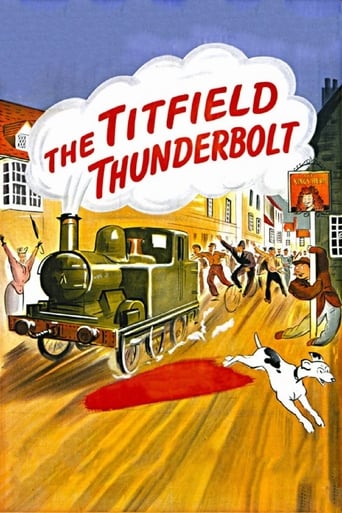

Intense, gripping, stylish and poignant
... View MoreCrappy film
... View MoreBetter Late Then Never
... View MoreAbsolutely brilliant
... View More(75%) A fine British comedy that is English as a rainy summer day. This really is a joy to watch with its fantastic pacing, eccentric characters, and a charming fun wit running right the way through. And despite this being incredibly twee with its chocolate box village, there is a rebellious spirit that bubbles to the surface that is present in many of these great Ealing films. It must be said this isn't what I'd call the funniest film of all time, or even the funniest Ealing film, but it's just so watchable and and likable, with the brilliant line from Stanley Holloway: "Is it a pleasant prison?" all making this a very worthy watch.
... View MoreBefore I begin, I wonder if anyone else noticed that the plot to this film is actually very, very similar to one of Harold Lloyd's films, SPEEDY. It, like the TITFIELD THUNDERBOLT, is about an older form of transportation that is supposed to be phased out in favor of the new, but people band together to keep their old line. In the case of SPEEDY, it was a trolley in New York in the late 1920s. Here, with the THUNDERBOLT, it's a train in a rural English town near the Welsh border (in the fictional town of Titfield which is supposedly near Bath). And, in both cases, the competition does its best to prevent the old line from fulfilling its obligation--thus putting the old company out of business. TITFIELD THUNDERBOLT is a bit different, as it's more of an ensemble film and the humor is a lot more subtle, but otherwise the films sure are similar.The film begins with an announcement that the old train line will be closed and replaced by the new bus service. However, the vicar and some of the other locals have a nostalgic love of the old service and approach the government to buy the line and run it themselves. However, again and again, the bus company does its best to make sure the train won't run on time and thus lose its contract. The final straw seems to be when the train is vandalized and made unusable on the night before the government inspector is due to inspect the railroad. What will they do--and why is the word 'Thunderbolt' in the film's title?! This is a nice gentle sort of film that hearkens back to bygone days--to an England that no longer exists. As such, the film is a great historical document and both entertains AND reminds us of our past. Additionally, a lovely ensemble cast, nice and leisurely direction and lovely color (a rarity in Ealing films) make for a memorable trip down memory lane.
... View MoreThe Ealing comedies have never looked as wonderful as in 'The Titfield Thunderbolt (1953),' the first from the studio to be filmed in Technicolor. Cinematographer Douglas Slocombe captures the sheer magnificence of the British countryside, every frame alive with the vibrant colours of the hills, the trees and the skies. The film was directed by Charles Crichton, who had earlier achieved success with 'The Lavender Hill Mob (1951),' and was penned by T.E.B. Clarke, who also wrote the outrageously whimsical 'Passport to Pimlico (1949),' encapsulating the wit and optimism of the British sense of humour in a way that typifies why such classic comedy gems are still treasured more than fifty years later. The story was inspired by real events, when local volunteers restored and operated the narrow gauge Talyllyn Railway in Wales.The residents of the small village of Titfield rely daily on trains to commute to work each day; so much so that the steam locomotive has become an icon of the town. However, when British Rail announces the intended closure of the service, the villagers are understandably devastated, and one resident, railway enthusiast Vicar Sam Weech (George Relph), decides to purchase the line and run it locally. Employing the funding of the wealthy and amiably-drunken Walter Valentine (Stanley Holloway), who is easily persuaded by the promise of an early-morning bar on the train, Sam and the other enthusiastic villagers convince the Ministry of Transport to offer them a one month trial, at the end of which their ability to run a train service will be determined. The only two men in town who don't approve of this daring venture are Pearce and Crump (Ewan Roberts and Jack MacGowran), the owners of a bus service, who plan to gain from the closure of the train service, and will try anything to prevent it from running again.'The Titfield Thunderbolt' shares many of its themes with a lot of the other Ealing comedies, most namely the notion of a small community taking on the "Big Guys" {also found in 'Passport to Pimlico' and 'Whisky Galore!'} and the potentially destructive forces of industrial progress {see also 'The Man in the White Suit (1951)'}. The acting is fun and light-hearted, and each of the characters possesses their own eccentricities, which makes them all equally enjoyable to watch. Considering its nature as a comedy, I was surprised to find that the film has some genuine moments of suspense, scenes that would not have seemed out-of-place in a Hitchcock film. I found myself gripping the seat in the sequence where the train passengers must disembark to collect water for the heating engine (after the water-tank is cunningly sabotaged), and also where the weak coupling between the engine and the carriage threatens to snap. The frequent use of rear-projection, which is relatively effective throughout the film, also reminded me of the Master of Suspense. It's an interesting comparison, I think.
... View MoreThis delightful comedy would be a joy in black-and-white. In Technicolor it's a real treat. The vividly English landscapes are used imaginatively to augment the appeal of the trains themselves. Color is drawn upon inventively to set the moods for various scenes and to cast a wonderful spell of romance, of firmly delineated villains and purest-motived heroes in a classic tale of St George versus the dragon.T.E.B. Clarke's wittily observed, richly characterized script offers a wonderfully unlikely St George in the local vicar. His squire is the young squire himself, his champion a friendly bishop. The dragons are the local bus proprietors. Very fitting. I love trains, hate buses. Any movie that toes this line is going to get 100% of my vote anyway.But, additionally, the acting here is so winning, so endearing, so priceless. Not a single player is out of step. All have their opportunities even Naunton Wayne (in a more or less straight role) and Sid James (as a heavy) and all make the most of them. It's good to see George Relph (a noted actor on stage, Relph made only 14 movies between 1916 and 1959) in the leading role, though Stanley Holloway's fans may be a bit disappointed to find his contribution is comparatively small and lines up as more of a character part than that of a clown. Nonetheless, he does make the most of some delightfully amusing lines and bits of business and does share some glorious moments of inspired slapstick with Hugh Griffith (even if topped by Wensley Pithey's breathless recital of their collective misdemeanors).Producer Michael Truman and director Charles Crichton have obviously made a considerable effort to cast Clarke's wonderful parade of village types with just the right players. Gabrielle Brune, hardly a household name (she made only 21 films between 1930 and 1972, mostly in very small roles) seems ideal as the local hostelry's sympathetic barmaid. Similarly, television actor John Rudling (who made only five films of which this is the third), delivers some of the script's most telling lines with exactly the right tone of brusque officiousness. Of course, people like Reginald Beckwith as the stumped union man and Michael Trubshawe as the "I was about to add" public servant play much their usual characters. But they do it so well and with such precision, who's complaining? Crichton's direction rates as beautifully paced and deftly assured as ever, whilst Slocombe's wondrous photography comes over so pleasingly you really need to see the movie three or four times to appreciate its richness. Auric's score is a crowd-pleaser too, whilst Seth Holt's editing seems as polished as spun gold.Produced on an admirably lavish budget, The Titfield Thunderbolt can be summed up as one of the most brilliant, enduring gems of British comedy. A must for train buffs of course. But equally a superb entertainment for all of us who like to see individuals win against bureaucracy, underdogs defeat "progress".
... View More